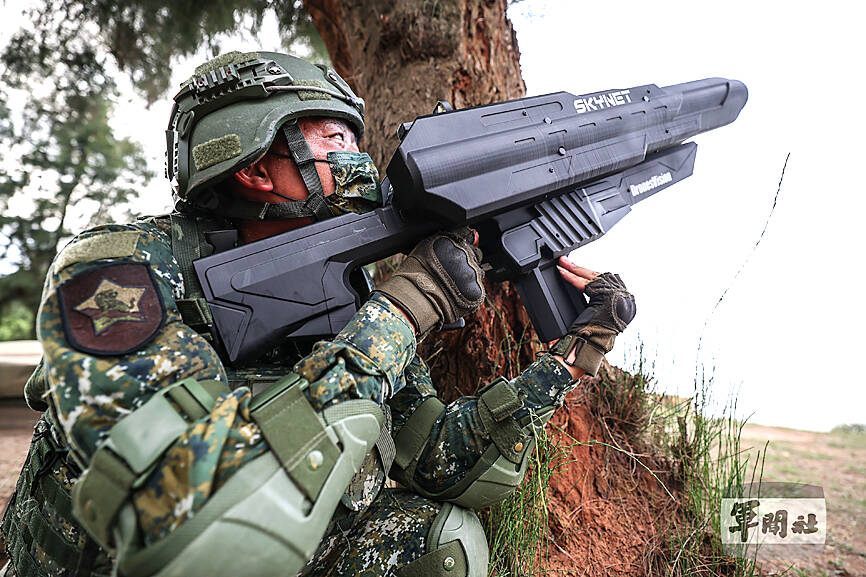A draft act to overhaul military base security and ban the use of drones near their premises cleared the first reading at the Legislative Yuan in Taipei yesterday.
Democratic Progressive Party (DPP) legislators Wang Ting-yu (王定宇) and Michelle Lin (林楚茵) said they proposed the legislation because security standards at military bases and during military drills are based on administrative orders.
Such orders are widely considered a weak legal basis and would be overruled if they are found to conflict with other laws, they said.

Photo courtesy of the Military News Agency
The draft act defines patrol methods, safety measures and bans practices that might compromise military base security, including the use of civilian drones.
The proposed legislation comes amid reports of increased civilian drone intrusions near military facilities on outlying islands, with the activity suspected to come from China.
The draft is next to be discussed by the National Defense and Foreign Affairs Committee.
The draft seeks to provide a legislative basis for patrols, guard duty, safety measures, restrictions, bans, contingency measures, reparations and punitive measures, Wang and Lin said.
The draft would also apply to security measures at the Presidential Office Building and the National Security Bureau, they added.
Under the draft act, people entering military bases without authorization could be fined NT$40,000 to NT$200,000 after a first warning and ordered to leave the base immediately. Those who fail to comply with such orders would be fined NT$60,000 to NT$300,000 and could be fined repeatedly. Flying drones would be banned over military drill areas, training areas or military bases, and contravention would lead to fines of NT$60,000 to NT$300,000, with repeated fines possible.
The draft also defines eight circumstances in which base commanders, on-duty military units, noncommissioned officers, guards and sentries are authorized to use weapons.
Guards and sentries must take necessary precautions and should only use weapons under the orders of a base commander, an officer on duty or a noncommissioned officer, the draft says.
Guards and sentries must warn a person before they raise or use weapons against them and must file a report with their commanding officer after such an incident, the draft act says.
People who are found recording video footage, taking pictures, sketching or taking notes at military facilities, as well as measuring their premises, would face prison terms of six months to three years, it says.
The draft also bans photography and recording equipment, as well as any other equipment that could compromise military security, at military bases.
People found to have such equipment would be warned and asked to hand over their equipment, and if they do not heed the warning, they would be banned from the site and fined NT$10,000 to NT$50,000, the draft says.

MORE VISITORS: The Tourism Administration said that it is seeing positive prospects in its efforts to expand the tourism market in North America and Europe Taiwan has been ranked as the cheapest place in the world to travel to this year, based on a list recommended by NerdWallet. The San Francisco-based personal finance company said that Taiwan topped the list of 16 nations it chose for budget travelers because US tourists do not need visas and travelers can easily have a good meal for less than US$10. A bus ride in Taipei costs just under US$0.50, while subway rides start at US$0.60, the firm said, adding that public transportation in Taiwan is easy to navigate. The firm also called Taiwan a “food lover’s paradise,” citing inexpensive breakfast stalls

TRADE: A mandatory declaration of origin for manufactured goods bound for the US is to take effect on May 7 to block China from exploiting Taiwan’s trade channels All products manufactured in Taiwan and exported to the US must include a signed declaration of origin starting on May 7, the Bureau of Foreign Trade announced yesterday. US President Donald Trump on April 2 imposed a 32 percent tariff on imports from Taiwan, but one week later announced a 90-day pause on its implementation. However, a universal 10 percent tariff was immediately applied to most imports from around the world. On April 12, the Trump administration further exempted computers, smartphones and semiconductors from the new tariffs. In response, President William Lai’s (賴清德) administration has introduced a series of countermeasures to support affected

CROSS-STRAIT: The vast majority of Taiwanese support maintaining the ‘status quo,’ while concern is rising about Beijing’s influence operations More than eight out of 10 Taiwanese reject Beijing’s “one country, two systems” framework for cross-strait relations, according to a survey released by the Mainland Affairs Council (MAC) on Thursday. The MAC’s latest quarterly survey found that 84.4 percent of respondents opposed Beijing’s “one country, two systems” formula for handling cross-strait relations — a figure consistent with past polling. Over the past three years, opposition to the framework has remained high, ranging from a low of 83.6 percent in April 2023 to a peak of 89.6 percent in April last year. In the most recent poll, 82.5 percent also rejected China’s

PLUGGING HOLES: The amendments would bring the legislation in line with systems found in other countries such as Japan and the US, Legislator Chen Kuan-ting said Democratic Progressive Party (DPP) Legislator Chen Kuan-ting (陳冠廷) has proposed amending national security legislation amid a spate of espionage cases. Potential gaps in security vetting procedures for personnel with access to sensitive information prompted him to propose the amendments, which would introduce changes to Article 14 of the Classified National Security Information Protection Act (國家機密保護法), Chen said yesterday. The proposal, which aims to enhance interagency vetting procedures and reduce the risk of classified information leaks, would establish a comprehensive security clearance system in Taiwan, he said. The amendment would require character and loyalty checks for civil servants and intelligence personnel prior to